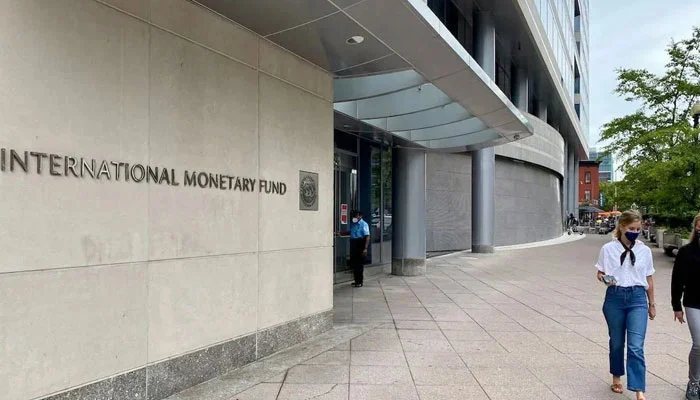Published in The News on November 15, 2023
In a positive development, Pakistan and the International Monetary Fund (IMF) have reached a staff-level agreement on the first review under a Stand-By Arrangement (SBA), subject to approval by the Executive Board of the global lender.
Upon approval, Pakistan will have access to $700 million, the IMF announced in a statement on Wednesday.
In conversation with The News, the Ministry of Finance’s former adviser Dr Khaqan Hassan Najeeb said the board’s approval will help Pakistan unlock more funding from other multilateral and bilateral donors.
“That is a good development and a satisfying one for Pakistan indeed,” he said, noting that inflation should steadily decline “is the thought process moving forward”.
The IMF said the agreement supports the Pakistani authorities’ commitment to advance the planned fiscal consolidation and accelerate cost-reducing reforms in the energy sector.
The short-term deal also envisages a complete return to a market-determined exchange rate, and pursues state-owned enterprise and governance reforms to attract investment and support job creation while continuing to strengthen social assistance.
“Anchored by the stabilisation policies under the SBA, a nascent recovery is underway, buoyed by international partners’ support and signs of improved confidence,” the statement added.
The Washington-based lender said steadfast execution of the FY24 budget, continued adjustment of energy prices, and renewed flows into the foreign exchange market have lessened fiscal and external pressures.
It further said inflation is expected to decline over the coming months amid receding supply constraints and modest demand.
However, Pakistan remains susceptible to significant external risks, including the intensification of geopolitical tensions, resurgent commodity prices, and the further tightening in global financial conditions, as per the IMF. “Efforts to build resilience need to continue.”
Pakistan clinched the deal with the IMF for the $3 billion short-term loan agreement in June this year, averting the looming default threat, and undertook painful economic reforms including hiking electricity and gas tariffs in line with the Lender’s conditions.
An IMF mission has been in Pakistan for the last two weeks for technical- and policy-level talks to review whether the government was on track to meet benchmarks set under the $3 billion standby arrangement agreed in July.
The IMF team led by Nathan Porter visited Islamabad from November 2-15, and held discussions with the authorities on the implementation of the SBA conditions.
“The IMF team thanks the Pakistani authorities, private sector, and development partners for fruitful discussions and cooperation throughout this mission.”
Fiscal consolidation
In the official statement, the IMF highlighted the Pakistani authorities’ policy priorities for balanced growth and strengthening macroeconomic sustainability.
The statement said authorities continued fiscal consolidation to reduce public debt, while protecting development needs.
According to the global lender, Pakistan authorities are determined to achieve a primary surplus of at least 0.4% of GDP in FY24, underpinned by federal and provincial government spending restraint and improved revenue performance supported, if necessary, by contingent measures.
“The authorities are building capacity to expand the tax base and raise revenue mobilisation and are committed to improving the quality of public investment and spending.”
The authorities will continue the timely disbursements for social protection under BISP’s budget allocation—which are about a third higher than in FY23.
Further reforms to reduce costs in the energy sector and restore its viability. With the combined circular debt (CD) across power and gas sectors exceeding 4% of GDP, immediate action was critical.
While protecting vulnerable consumers, the IMF said authorities implemented power tariff adjustments that were pending since July 2023 and increased gas prices after a long time, effective November 1, 2023.
While these increases were substantial, they were necessary to avoid further arrears that threatened the viability of these sectors and the provision of critical energy supplies.
The authorities are also moving to tackle cost-side pressures, including bringing private sector participation to DISCOs, institutionalizing recovery and anti-theft actions, improving PPA terms, and reducing the incentives for captive power.
Market-based exchange rate
While inflows following increased regulatory and law enforcement helped normalise import and foreign exchange payments and rebuild reserves, the authorities recognised that the rupee must remain market-determined to sustainably alleviate external pressures and rebuild reserves.
To support this, Pakistan plans to strengthen the transparency and efficiency of the foreign currency market and to refrain from administrative actions to influence the rupee, the statement said.
With appropriately tight monetary policy, inflation should steadily decline and the authorities stand ready to respond resolutely if near-term price pressures reemerge, including due to second-round effects on core inflation or renewed exchange rate depreciation.
The IMF said the Pakistani authorities will ensure public access to asset declarations from the cabinet members and a task force, with participation from independent experts, will complete a comprehensive review of the anticorruption framework to further strengthen governance.
“The [Pakistan] authorities have accelerated the engagement with multilateral and official bilateral partners. Timely disbursement of committed external support remains critical to support the authorities’ policy and reform efforts.”




